“The web has become a public square, a library, a doctor’s office, a shop, a school, a design studio, an office, a cinema, a bank, and so much more. … Today, half of the world is online.”(Tim, 2019) In the era of Internet, people’s lirves are closely connected with the Internet. The Internet has brought convenience to the way of life, while, it has also brought many problems.
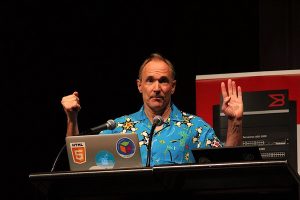
“I don’t know – 2013-02-01” by 4nitsirk is licensed under CC BY-SA 2.0
Techlash is the word first coined by The Economist to describe the new fact, which is that the public, politicians, and governments are increasingly dissatisfied with the power of Big tech (The economist, 2018). The media and the government have collectively censored large companies. Big tech is companies point out like Google, Facebook, Amazon, Apple, Netflix. The public is aware that traditional regulation is no longer applicable to new media, which has aroused public concerns about media capitalism. It was first to come out by The Economist in November 2013 as an article title which is a portmanteau comprising “technology” and “backlash” (Adrian, 2013). Also, It is the combination of the dash punctuation mark that was showing as “tech-lash”. In the Oxford English Dictionary (2018), Techlash defined as “A strong and widespread negative reaction to the growing power and influence of large technology companies, particularly those based in Silicon Valle.” Data privacy plays a significant role in the Techlash, which exacerbating the public’s aversion to data collection and use. “By now, the digital revolution is not just the future;… It is a tool of both surveillance and resistance.” (Deanne, 2018). Lots of breaches have heightened public concerns about data privacy breaches. The public widely uses the word Techlash, and the related issues are at the forefront.
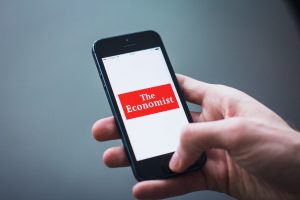
“Economist app” by freestocks.org is marked with CC0 1.0
THE DISTRUST OF THE PUBLIC
People become distrust about the Big Tech as well as their commitments. The last decade has witnessed a severe rise in the level of people who doubt Big tech. Britain’s Channel 4 News photographed Cambridge Analytica and hinted that the company used information leakage to help political candidates win votes (Sam, 2018). This company works for Trump’s election campaign. At this time, the data leakage is likely to affect the 2016 US election, and Trump won the presidential election in 2016. Facebook has provided up to millions of Facebook user data to Cambridge Analytica researchers (Alvin, 2018). Subsequently, both Facebook and Cambridge Analytica denied the data disclosure in their statements. This event has a significant influence. The public is aware of the risk of personal privacy data leaked through this crisis. After that, the concept of Techlash has paid more and more attention. The monopoly of large companies will make it easier to collect data, so many users’ privacy is more likely to be violated.
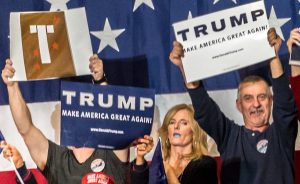
“Donald Trump in Reno, Nevada” by Darron Birgenheier is licensed under CC BY-SA 2.0
What may harm the entire market is the harm and impact on users and the monopoly of large companies. Large companies can use their strong market position to formulate rules, crowd out weaker competitors, weaken the living space of small companies, and create industry monopolies (Ellis, 2019). The emergence of industry monopolies is not conducive to the diversified development of news and information publishing (Sacha, 2019). Each company has its development policies and preferences. If one company is dominant, the intentions of the entire industry will be unified, which is not conducive to the development of the industry. After a company monopolizes the market, users are forced to lose their choices, which is not conducive to alleviating Techlash in disguise.

“Geek Cake Shop” by Cakehead Loves is licensed under CC BY-NC 2.0
In 2011, Elis put forward The Filter Bubble’s concept to describe the Internet engine algorithm (Elis, 2011). This algorithm is simply that Internet companies will automatically filter users’ preferences to improve their attractiveness, push the content that users will like in the algorithm, and solidify users’ preferences (Safiya, 2018). Gradually, the Internet creates a comfortable circle for users, and content with different opinions from users will be excluded. For a long time, people could only touch the content they were familiar with. Filtering bubbles will make vulnerable groups vulnerable and racist and hate speech users. Actions by groups can exacerbate harm to minorities.

“File:Eli Pariser, author of The Filter Bubble – Flickr – Knight Foundation.jpg” by Knight Foundation is licensed under CC BY-SA 2.0
HOW THREE ORGANIZATIONS SETTLE THE TECHLASH
The self-regulation of enterprises is the most efficient compared with the government and citizen organizations. The self-regulation of enterprises is the implementation of corporate social responsibility. The advantage of enterprise self-regulation is that enterprises execute faster. Faster self-regulation means consumers will get the protection they need faster, and their needs can be met quickly. However, the disadvantages of the self-regulation of technology companies are apparent. Companies are based on business. The establishment and operation of enterprises have business objectives. The motivation of enterprises is to increase their status and influence in order to expand their business territory. Public value and public demand are secondary considerations for enterprises. It is difficult for all enterprises to ensure the fairness of the self-monitoring process. Therefore, simply believing that the self-regulation of enterprises is risky. In a word, the execution of enterprise self-supervision is not solid and challenging to control. Compared with the self-regulation of enterprises, the executive power of government regulation is more substantial, and the government is more fair and just.
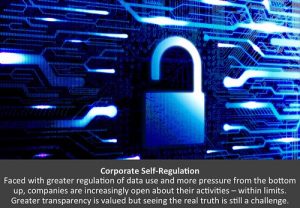
“Corporate Self-Regulation” by future.agenda is licensed under CC BY-NC-SA 2.0
The government’s regulatory execution is the strongest. As an external supervision system, it can supervise the places where the industry needs supervision through law. Through the law, the efficiency of supervision is higher. Australia first announced in 2017 that it would launch a consumer data rights bill in Australia. Consumer data right means that consumers and people in business can conduct safe data analysis, protecting consumers’ data rights. On March 29, 2019, the Australian Competition and Consumer Commission (ACCC) officially released the draft consumer data proper draft rules out (CDR) in Australia (ACCC, 2019). The process of formulating, supervising, and implementing energy and electricity rules is subject to this act’s relevant rules and regulations. The government’s executive and regulatory power are vital, which is not separate in government institutions. Not only ACCC but also Australia communications and media authority (ACMA) is working on it. Government agencies are decentralized and large and can be connected to help each other. The government is the only regulatory organization that can formulate laws. The government’s regulation of the Internet has no commercial purpose. The government’s supervision is intense, but it is also weak. Implementing government supervision is very time-consuming, and it takes a long time to formulate, supervise and implement rules. Moreover, due to their independent legal system, the rules formulated by individual countries can only be applied in their own countries, and the rules are difficult to be implemented across borders. For example, the general data protection regulations implemented by the EU do not apply to Australia.

“AU Medalian – Nelson Mandela Plenary Hall” by andryn2006 is licensed under CC BY-SA 2.0
Citizen organizations also need to be involved in monitoring technology companies and protecting their data privacy. Although citizen participation in supervision can not play a decisive role, the supervision of citizen organizations can only be advocacy. However, citizens can supervise the self-monitoring of the government and technology companies and urge them to cooperate and implement relevant rules. The power of citizens is diversified. Citizens represent people from all walks of life. Every citizen needs data privacy. Diversified discussions and opinions are also conducive to the development of mobile phones for regulatory data and regulatory implementation.
Moreover, while citizens participate supervision of technology companies, their intention to protect their rights and interests has also been strengthened. For citizen participation, promoting public opinion’s support for supervision can also make citizens aware of the importance and necessity of supervision. Therefore, civic organizations must join the ranks of supervision.
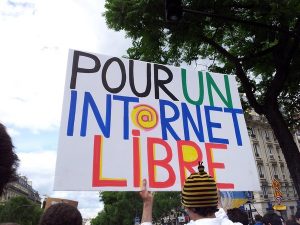
“pour un internet libre” by g4ll4is is licensed under CC BY-SA 2.0
THE CONCLUSION
Techlash is the word first coined by The Economist to describe the new fact that the public, politicians, and governments are increasingly dissatisfied with the power of Big tech. The various Techlash issues, which exacerbates the public’s aversion to data collection and use. The three organizations: the government, the companies, the public, all are monitoring the companies. Enterprise self-regulation’s advantage is that enterprises execute faster. It is difficult for all enterprises to ensure the fairness of the self-monitoring process. Government regulation is more substantial and fair, and just. The process of formulating, supervising, and implementing is slow. Although citizen participation can not play a decisive role, the supervision of citizen organizations can only be advocacy.
Reference List
Alvin Chang. The Facebook and Cambridge Analytica scandal, explained with a simple diagram. (2018). https://www.vox.com/policy-and-politics/2018/3/23/17151916/facebook-cambridge-analytica-trump-diagram
Adrian Wooldridge. (2013). The coming tech-lash. https://www.economist.com/news/2013/11/18/the-coming-tech-lash
Brenton Holmes. (2011). Citizens’ engagement in policymaking and the design of public services. https://www.aph.gov.au/about_parliament/parliamentary_departments/parliamentary_library/pubs/rp/rp1112/12rp01
Consumer Data Right draft rules out. (2019). ACCC. https://www.accc.gov.au/media-release/consumer-data-right-draft-rules-out
Daniel Castro. (2011). Benefits and Limitations of Industry Self-Regulation for Online Behavioral Advertising. The Information Technology& Innovation Founction. https://itif.org/files/2011-self-regulation-online-behavioral-advertising.pdf
Deanne Cheuk. 25 Years of WIRED Predictions: Why the Future Never Arrives. (2018). https://www.wired.com/story/wired25-david-karpf-issues-tech-predictions/
Eli Pariser. (2013). The Filter Bubble: What The Internet Is Hiding From You
Martha Lagace. (2007). 09 APR 2007RESEARCH & IDEAS Industry Self-Regulation: What’s Working (and What’s Not)?. https://hbswk.hbs.edu/item/industry-self-regulation-whats-working-and-whats-not
Noble, S. U. (2018). Algorithms of Oppression: How Search Engines Reinforce Racism. NYU Press. https://doi.org/10.2307/j.ctt1pwt9w5
Sam Meredith. (2018, March 23). Here’s everything you need to know about the Cambridge Analytica scandal. Consumer News and Business Channel. https://www.cnbc.com/2018/03/21/facebook-cambridge-analytica-scandal-everything-you-need-to-know.html
Sacha Baron Cohen. Read Sacha Baron Cohen’s scathing attack on Facebook in full: ‘greatest propaganda machine in history’. (2018).https://www.theguardian.com/technology/2019/nov/22/sacha-baron-cohen-facebook-propaganda
Samuel Paul. (2002). Holding the State to Account: Citizen Monitoring in Action
What is Techlash and what does it mean for the digital industry?. (2019). :Freya King. https://www.balticapprenticeships.com/blog/what-is-techlash-and-what-does-it-mean-for-the-digital-industry
Tim Berner Lee. (2020). ’30 years on, what’s next#fortheweb’. https://webfoundation.org/2019/03/web-birthday-30/
The techlash against Amazon, Facebook and Google—and what they can do. (2018). https://www.economist.com/briefing/2018/01/20/the-techlash-against-amazon-facebook-and-google-and-what-they-can-do
Word of the Year 2018: Shortlist. (2018). OxfordLanguages. https://languages.oup.com/word-of-the-year/2018-shortlist/
Reference List of Pictures
“pour un internet libre” by g4ll4is is licensed under CC BY-SA 2.0
“I don’t know – 2013-02-01” by 4nitsirk is licensed under CC BY-SA 2.0
“Economist app” by freestocks.org is marked with CC0 1.0
“Donald Trump in Reno, Nevada” by Darron Birgenheier is licensed under CC BY-SA 2.0
“Geek Cake Shop” by Cakehead Loves is licensed under CC BY-NC 2.0
“File:Eli Pariser, author of The Filter Bubble – Flickr – Knight Foundation.jpg” by Knight Foundation is licensed under CC BY-SA 2.0
“Corporate Self-Regulation” by future.agenda is licensed under CC BY-NC-SA 2.0
“AU Medalian – Nelson Mandela Plenary Hall” by andryn2006 is licensed under CC BY-SA 2.0
“pour un internet libre” by g4ll4is is licensed under CC BY-SA 2.0